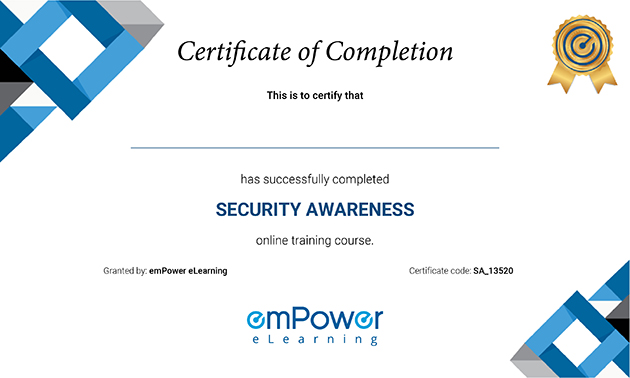Best Introduction to Information Security Course
Understand the key aspects of information security, and how they apply to the information that you handle everyday

Our Client

































What is an Introduction to Information Security Training
For those who use or store sensitive data, it’s important to understand what information security is. Most importantly, you must possess a clear understanding and respect for the three principles of information security. Along with this, you need to be aware of security risks and threats that you might encounter at work or at home.
Such risks can be internal or external. Threats too can be internal or external. You need to guard against both. For this, developing a good understanding of cybersecurity technologies should be considered a starting point. But, there’s more. You also need to learn about the basic principles of data protection.
As you go through this course, we’ll introduce you to different kinds of information that you might come across at work. Information security also concerns the security of your personal information.
We’ll look at various threats, and why you need to care about security incidents as well. The course would also familiarize you with the three fundamental principles of information security. We’ll introduce you to policies, standards, and procedures.
By the end of the training, you’d have a fair understanding of
- What information security is
- How it affects your work and personal life
- The value of the three fundamental principles, and how they apply to your work
Course Description
| Category | Information Security |
| Course Name | An Introduction to Information Security |
| Duration | 30 mins |
| Certificate Included | Yes |
| Languages | English |
| Course Type | Interactive online training |
| Narration | Yes |
| Format | LM-light, SCORM 1.2 |
| Supported Devices | Desktop/Laptop, Tablet, Phone |
| Last Updated | June 30, 2021 |
What you’ll learn
- What is information security
- Various forms of information
- What are the common threats to information security
- How a data breach could affect your organization and yourself
- What information need to be protected
- Basic principles of information security
- Difference between policies, standards, and procedures
Curriculum
- Introduction to information security
- What is the structure of this course?
- What is information security?
- Information that you use at work
- Information that you use at home
- Important information security threats
- Why should I care about information security?
- Basic principles of data security
- What is confidentiality?
- What is integrity?
- What is availability?
- More about policies, standards, and procedures
- What do we meet by “policy”?
- What do we mean by “standard”?
- What do we mean by “procedure”?
- Why are policies, standards, and procedures important?
- What if you ignore policies, standards, and procedures?
- What you should have learned in this lesson?
Who Should Attend?
- Members of staff who are new to information security
- Staff members who want to refresh their knowledge about the basics of information security
- Staff members who deal with data at work
Why emPower
100s of customers
- 14+ Years of experience in working with small to large businesses from different industries
- 95% customer retention
Customer Experience
- 24x7 dedicated support and toll free number
- 99%+ guaranteed uptime
Extremely Cost-effective
- As low as $0.99/user/yr
- We will match or better the price of your current LMS
Effective Courses
- Each course is 20-40 min long to ensure engagement with quizzes and certificate
- SCORM 1.2 Compliant
Implementation
- No setup costs
- We deploy your customized solution in less than 48 hours
Our Achievements
Here you can review some statistics about our Education Center
Start Your Certification Course Today
Security awareness is one of the most effective ways to protect the data on your network from cyberattacks, data breaches, and insider threats.
Moreover, NIST regulations require organizations to ensure that their workforce is properly trained to carry out their security responsibilities before allowing them access to the systems.
This includes training on organizational policies, standards, and procedures, and security techniques, such as good password practices, access control, and secure use of emails.
In addition, the NIST standards also suggest that workers should receive periodic refresher training to account for any changes in responsibilities, and updates in company policies and procedures.
As per the NIST, security awareness and training can help guard your information assets against security threats.
Firstly, the training would familiarize your workers with company policies and procedures for accessing, using, and sharing information.
Secondly, the training would make your workforce aware of good security practices, and alert them against the bad ones.
Thirdly, it would prepare your workers for responding to information security threats. This is because workers play an important role in identifying potential threats. Training would help them identify potential threats, take immediate precautions, and report the threat to the security team.
In essence, security awareness training can prepare your organization to guard against cyberattacks and other information security threats.
Conducting security awareness training is mandatory under various Federal and State laws.
Major federal laws, mandating such training include,
- Health Insurance Portability and Accountability Act (HIPAA)
- Gramm-Leach-Bliley Act (GLBA)
- Payment Card Industry Data Security Standard (PCI DSS),
- Federal Information Security Modernization Act (FISMA)
Along with the federal laws, many states mandate security awareness training as well. This includes Louisiana, Montana, New Jersey, Alabama, and so on.
Some of these laws require annual or periodic refresher training as well. Non-compliance with such regulations can attract steep penalties for an employer.
Apart from the US laws, organizations in business with the EU, need to comply with General Data Protection Regulation (GDPR) too. The GDPR guards the data privacy of EU citizens. Along with other protections, the law also requires businesses to conduct annual security training for their workers.

